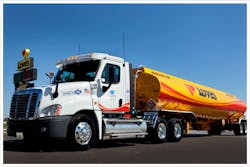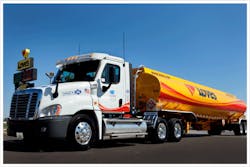Here’s an unlikely recipe for success, if you care to try it: Take $5,000 and plunk it down on a lease for an abandoned gas station. Then add in a country store and deli operation and staff it with employees steeped in old fashioned Oklahoma values. Now sit back and wait 50 years.
End result? How about 310 “travel centers” for cars and commercial trucks, plus 180 dedicated truck tire care centers, staffed by 10,000 employees scattered throughout 39 states – soon to be 40 states, once a new location opens up in Cumberland, MD, this fall – that generated a hair over $26 billion in estimated revenue last year; estimated because, well, it’s still a family-owned and operated business after all.
It may seem overly simplified, but basically that’s how Tom and Judy Love built the Love’s Travel Stops network in what Forbes magazine recently declared is the ninth largest privately-owned company in the U.S.
Starting out with that single, lonely abandoned filling station in Watonga, OK, back in 1964 – originally naming their family venture “Muskrat Corp.” until changing to the family name in 1974 – they just kept working at the business through both the good and lean times; relying on tough Oklahoman grit to keep the Love’s business healthy and growing.
[The company put together a more detailed video overview of its history, which you can view below, back when Love’s turned 45 in 2009.]
“I’m humbled every day by our success,” noted Tom Love, who remains executive chairman of the business that bears his family’s name, during the opening of the company’s newest location in St. Louis back in January. “Our unwavering commitment to our customers has been a significant force. Many companies are still struggling due to the economy, but we’re fortunate to maintain our growth status. I’m proud of how far we’ve come.”
[To view a photo gallery tracing Love’s history, please click here.]
That “growth status” originally just focused on car traffic, with the Love family adding a “Mini Stop Country Store” to its self-service gas stations back in 1972, followed by “Fresh Daily Deli” in 1978 when its network reach 60 locations.
But around 1981, a new focus for Love’s developed: truckers. That’s when it also switched to its now-ubiquitous bright yellow décor and heart-shaped logo, while opening facilities that could serve the needs of both everyday motorists and trucks drivers alike.
Love’s focus on trucking fostered the development of a range of new services, such as its light mechanical program for commercial vehicles:
And though rooted in what are commonly dubbed “old fashioned” values – which include an enormous amount of charity work, by the way: Love's partnered in 1998 with Children's Miracle Network to hold an annual in-store fundraiser and to date has raised more than $4 million for children's medical research – the company doesn’t shrink from trying out new things, especially where technology is concerned.
For example, there’s Love’s “Connect” program:
On another front, Love’s also rolled out RFID cardless fueling services for truckers, with “RFID” short for “radio frequency identification” technology:
Love’s also isn’t shy about staying abreast of the alternative fuels movement, adding in compressed natural gas (CNG) pumps at two of its locations to support those trucking operations using natural gas to power their rigs:
Indeed, Love’s is “walking the talk” when it comes to natural gas as a truck fuel, too; deciding to purchase 25 Freightliner Cascadia and 25 Peterbilt trucks with the Cummins Westport 12-liter compressed natural gas (CNG) engine last year for its tanker fleet, operating under the name Gemini Transport.
Gemini – founded in 2001 and today operating a fleet of 400 Freightliner Cascadia trucks and employing 600 drivers – has been testing the 12-liter CNG engine in one of its Freightliner fuel trucks since September 2012.“We’ve had great success with the CNG engine in delivering fuel to Love’s locations in our home state of Oklahoma,” noted Brent Bergevin, Gemini’s director of transportation. “The CNG engine has a 450-mile range, and we’ve seen a significant cost benefit in using CNG as a transportation fuel.”
Love’s also recently announced an expansion of its network of “fast-fill” CNG locations for Class 8 trucks (capable of pumping 10 equivalent gallons of CNG per minute) to the Texas Triangle cities of Dallas, Houston and San Antonio – altogether hoping to have 11 such “fast-fill” pumps open within the year. The company noted that its new Gemini CNG trucks will be used to deliver natural gas truck fuel to those metro areas and Oklahoma City.
Suffice to say it’s been a busy half century for Love’s Travel Stops; thus one can only imagine what the company might develop over the next 50 years.

